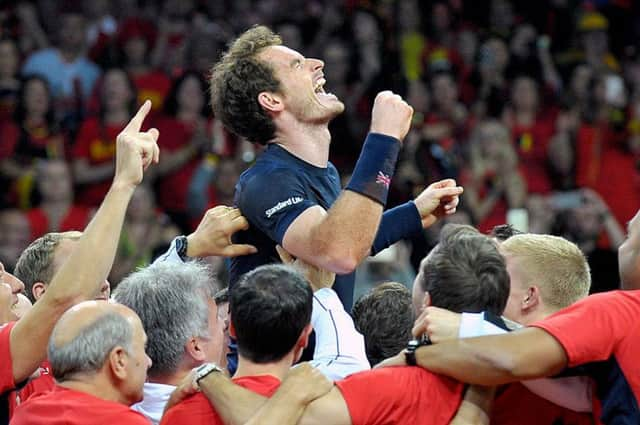Alan Pattullo: Davis Cup win must be built on


It is an achievement in itself to ensure tennis, normally restricted to a fortnight in high summer, leapt to the top of the sporting agenda in late November. Courtesy of Sunday night’s success, when the Davis Cup team also quite rightfully earned the team of the year award, the sport has again become the topic du jour – in December.
So the Davis Cup win has meant a considerable amount, with much having flowed from it. But even in its own right, it was highly significant. After all, the achievement involved regaining a handsome trophy that had last spent time in the country in the 1930s. It was secured in a partisan arena. Not only did Great Britain have to beat Belgium, they had to do so in Belgium.
Advertisement
Hide AdAdvertisement
Hide AdSome have expressed surprise that Murray clinched another SPOTY award for what amounted to a couple of wins over opponents he was expected to beat, and for another victory in a doubles rubber with his brother, Jamie. But one has to remember it was not just about the final.
Murray also went above and beyond in the first-round clash with the United States in Glasgow in March, and also the quarter-final against France, just a matter of days after a disappointing semi-final exit at Wimbledon. He also shrugged off a back complaint to again become the main man in the semi-final win over Australia inside a raucous Emirates Arena, back in Glasgow once more.
So the Davis Cup win was a laudable achievement. It was epic in scale when you consider not just the length of time since the last victory, but also because Britain’s journey to the winners’ podium in Ghent had begun in such lowly, inauspicious circumstances, as Murray himself noted on Sunday night in Belfast. And, for those who question the concept of a team award going to a team where one individual was such a dominant party, Murray would be the first to acknowledge his absence at the beginning of the road to glory.
Had it not been for his team-mates winning such glamourousless ties as against Turkey in downtown Eastbourne, there would have been no prospect of reaching, and then winning, the final.
The journey started in 2010 when Glasgow’s Leon Smith took over the captaincy of a team who were in danger of dropping to the lowest Davis Cup tier, with the likes of Andorra and Moldova. A win over Turkey, with a team still including two Scots, Jamie Baker and Colin Fleming, prevented that, securing the team’s Europe/Africa Zone Group II status for the time being.
It also pushed the ignition button on a journey that reached such a thrilling climax at Flanders Expo on the outskirts of Ghent at the end of last month. No-one could mistake the venue for a theatre of dreams, that’s for sure. Located opposite an Ikea shopping centre, it is the kind of place normally used to host motor shows or, at the other extreme, all-night raves.
But the Belgians did what they could to dress it up, even helpfully adding a “British Bar”, where the 1,300 or so visiting fans, with at least half seeming to have travelled from Scotland, could, the Belgian organisers hoped, drown their sorrows.
In view of Murray’s determination to end the year on a high, there was not much chance of that happening. Indeed, it looked as though Britain might have a chance to win the final on the middle day, as Kyle Edmund, on his debut, raced into a two-set lead against David Goffin. But the world No 15 got his act together, and averted what would have been a personal catastrophe in front of 12,000 expectant home fans by winning in five sets.
Advertisement
Hide AdAdvertisement
Hide AdMurray followed, quickly taking care of the second singles rubber against a raw Ruben Bemelmans, to leave the score all square at 1-1, as had been expected. So yet again much rested on the pairing of the Murray brothers in the doubles, and once again they came out on top in another epic tussle, this time against Goffin and Steve Darcis, with Jamie recovering from some shaky moments to serve out for victory.
So a single house in Dunblane had put Britain within touching distance of history. It was left to Andy to finish off the job against Goffin, against whom he had never lost. Roared on by the irrepressible Stirling University Barmy Army, among others, he did so in straight sets and without too many anxious moments, leaving his best shot until last to secure the win with an outrageous lob. He crumpled to the clay floor before being very quickly mobbed by his delighted team-mates, whose debt of gratitude to the Scot(s) was and is enormous. As is that felt by the whole of British tennis. Depending on the level of Andy’s commitment to the Davis Cup next year, and beyond, we may never see the like again.
The fear that British tennis fails to build on such a victory dominated the winners’ press conference the following morning, and was again touched on by Smith on Sunday night, as he picked up the team-of-the-year award. The Davis Cup win was indeed historic but in order to be truly momentous, its inspirational properties must be mined to the max.